SPELL Autism Framework
Creating Better Support Environments for Autistic Individuals

Understanding the SPELL Autism Framework
The SPELL Autism Framework, developed by the National Autistic Society, offers a comprehensive approach to supporting autistic children and adults. Its principles inform educators, caregivers, and professionals about creating environments that promote well-being, understanding, and development. This article explores the framework’s core concepts, application, training opportunities, and its vital role in autism support strategies.
Fundamental Principles of the SPELL Autism Framework
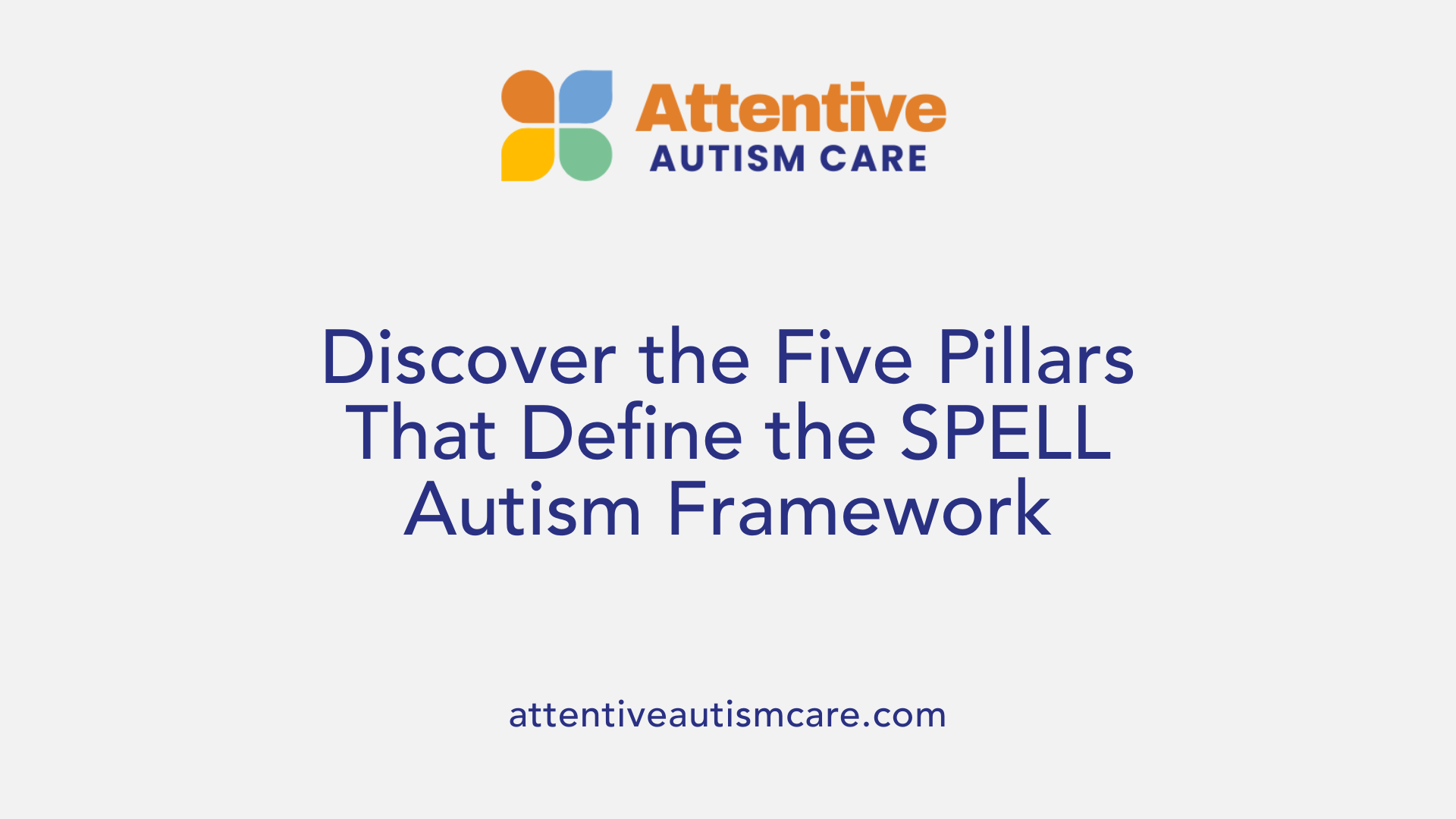
What is the SPELL Autism Framework and what are its fundamental principles?
The SPELL Autism Framework, developed by the National Autistic Society, is a comprehensive, person-centered approach designed to support individuals with autism. It is built around five main principles that guide how caregivers, educators, and professionals can create environments and interactions that foster well-being and development.
These five pillars include: Structure, Positive approaches and expectations, Empathy, Low arousal, and Links. Each element plays a vital role in understanding and meeting the unique needs of autistic individuals.
The Five Pillars of SPELL
- Structure: This involves creating predictable routines and visual supports, such as schedules and cues, to reduce stress and increase confidence. Well-structured environments help autistic people feel safe and in control.
- Positive Approaches and Expectations: Emphasizing strengths and interests, this pillar promotes building self-esteem through encouragement, rewards, and realistic goal-setting tailored to individual abilities.
- Empathy: Understanding how autistic individuals perceive the world is fundamental. This means caregivers and professionals aim to see things from their perspective, recognizing what excites, scares, or causes frustration.
- Low Arousal: Managing sensory input is crucial. Strategies include creating calm environments, limiting noise and bright lights, and minimizing sudden changes, all aimed at reducing sensory overload and promoting calm interactions.
- Links: Maintaining open and positive communication channels with families, caregivers, and support networks ensures consistent understanding and collaborative support.
The framework’s holistic approach supports individuals across all ages and levels of support needs. Its principles are anchored in creating accessible, respectful environments that recognize the diversity of autistic experiences.
A person-centered and holistic approach
The SPELL framework emphasizes understanding each individual as a whole person—focusing on their strengths, preferences, and needs. This approach encourages building trust and rapport, fostering independence, and enhancing quality of life.
Implementation often involves environmental adjustments, personalized strategies, and collaborative teamwork. The framework also aligns with other evidence-based practices, making it versatile and adaptable.
In summary, SPELL offers a practical guide for creating supportive spaces that respect autonomy, promote positive interactions, and respect the individual’s sensory and emotional needs. Its fundamental aim is to empower autistic individuals to thrive in environments tailored to their diverse needs.
Operational Aspects and Practical Implementation
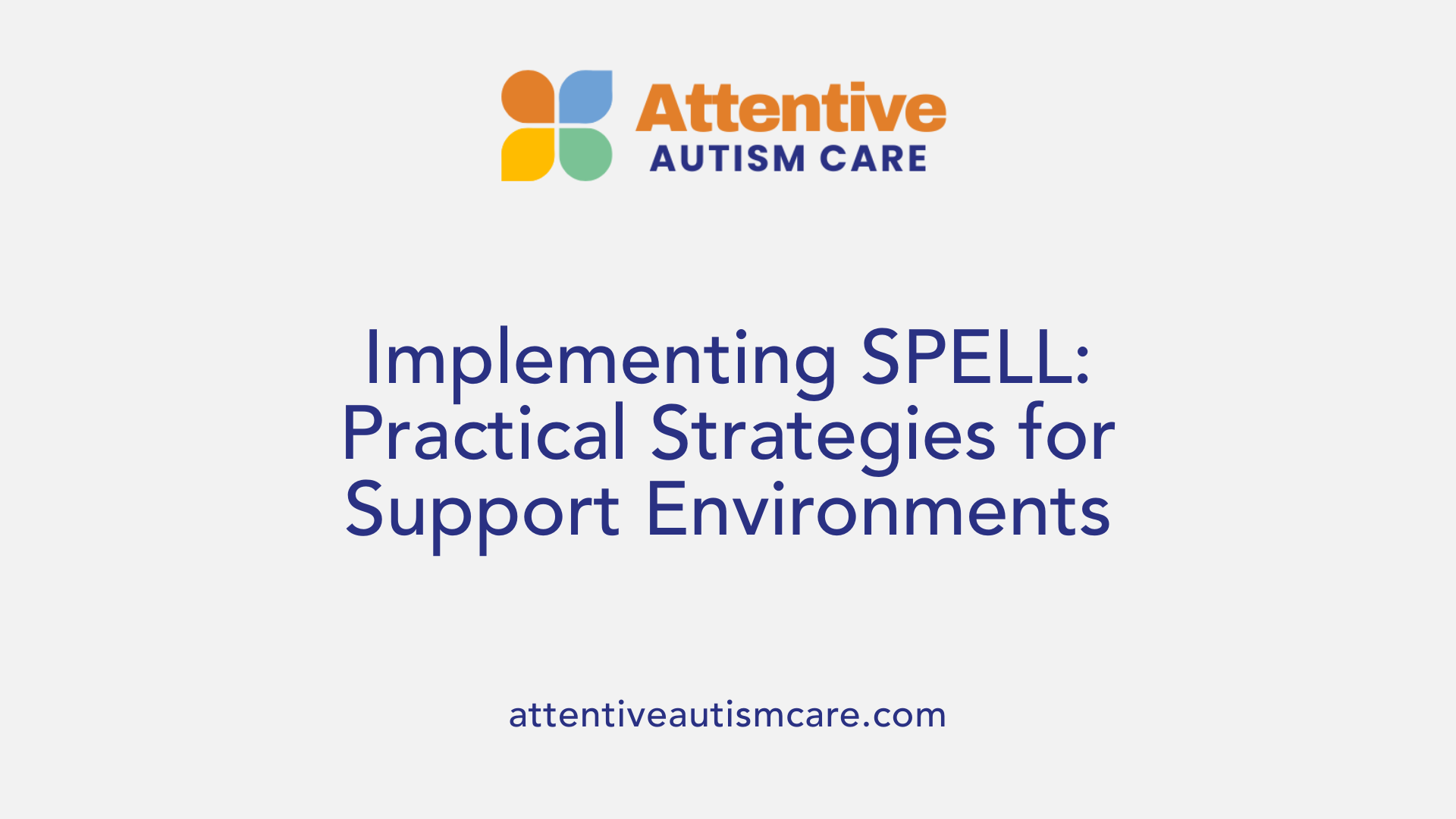 The SPELL framework offers a comprehensive guide for creating supportive environments that meet the diverse needs of autistic individuals. Central to this approach is understanding how the environment is structured to foster predictability and security. This involves setting up physical spaces with visual cues and routines that help autistic people understand what to expect, reducing anxiety and encouraging confidence.
The SPELL framework offers a comprehensive guide for creating supportive environments that meet the diverse needs of autistic individuals. Central to this approach is understanding how the environment is structured to foster predictability and security. This involves setting up physical spaces with visual cues and routines that help autistic people understand what to expect, reducing anxiety and encouraging confidence.
Use of visual supports and routines is pivotal in operationalizing SPELL. Visual tools such as schedules, communication fans, and visual cues clarify daily activities and expectations, making transitions smoother. Routines are consistently applied to provide stability, which helps in managing sensory sensitivities and behavioral challenges.
The framework's flexibility allows it to be applied across a wide range of settings—from educational institutions and inpatient facilities to community health and justice environments. It is also suitable for individuals of all ages and varying support needs, ensuring a person-centered approach throughout life stages.
Personalized goals are a vital aspect of the SPELL approach. These goals focus on building individual strengths, fostering independence, and improving well-being. They are collaboratively developed with autistic individuals, their families, and support teams to ensure relevance and motivation.
Training for professionals plays a crucial role in actualizing SPELL principles effectively. The National Autistic Society offers a three-day licensed user training course, equipping staff with the skills to implement these strategies reliably. This training encourages ongoing reflection, typically supported by tools like the SPELL audit, which helps teams assess and improve their practice.
In summary, the operational success of SPELL hinges on environmental planning, visual supports, adaptable application across settings and ages, and personalized goal setting. These components work together to create nurturing and accessible spaces that respect and promote the potential of autistic individuals.
Training and Development Opportunities
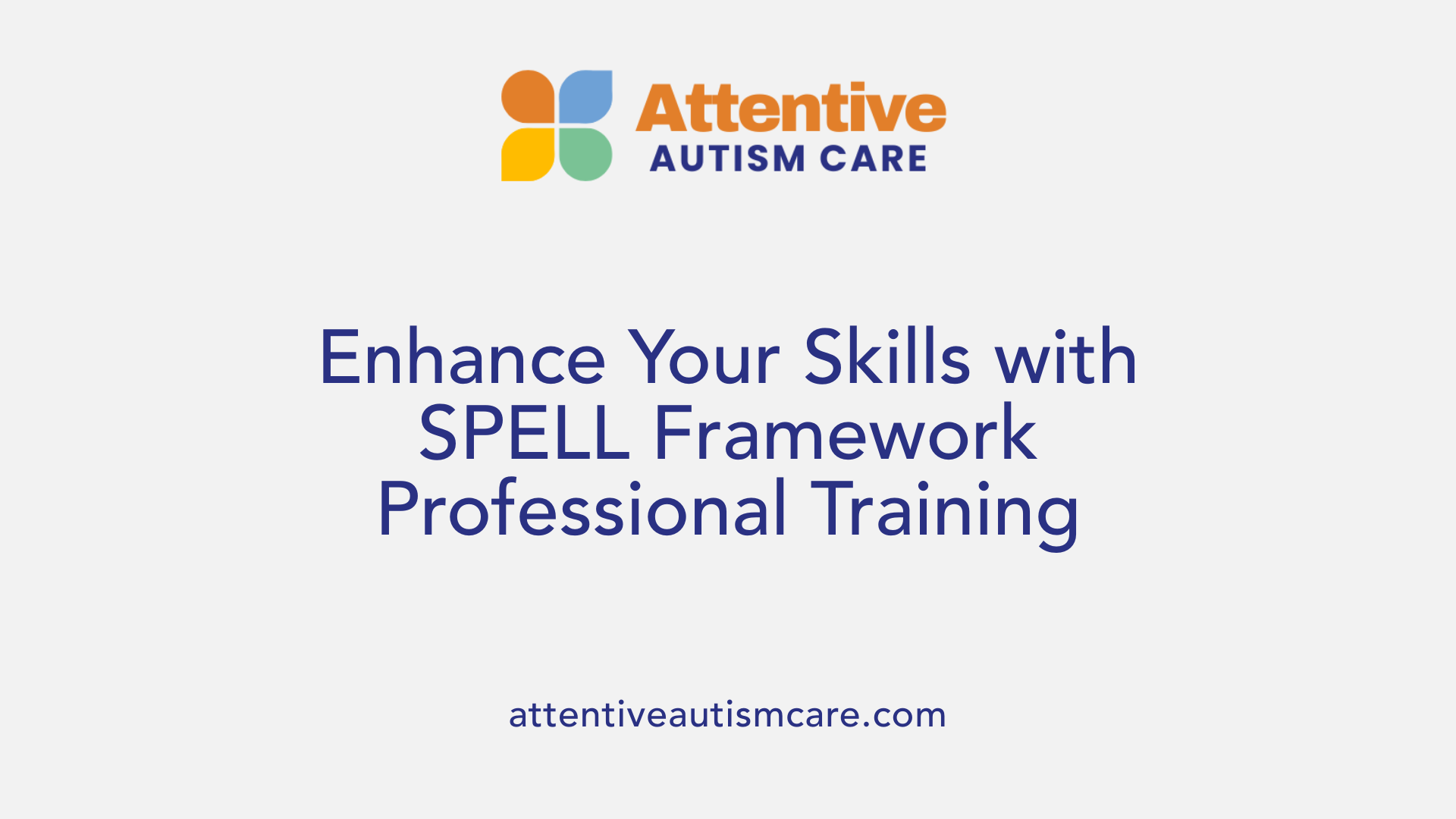
What training options are available for implementing the SPELL Autism Framework?
The National Autistic Society offers comprehensive training programs tailored to support professionals in implementing the SPELL Autism Framework effectively. These programs include a three-day licensed user training course called 'Supporting Autistic People Using the SPELL Framework,' designed for staff teams working with autistic individuals.
This course provides in-depth knowledge about the core principles of SPELL — Structure, Positive approaches, Empathy, Low arousal, and Links — and guides participants on how to apply these principles in practice. Participants learn to create predictable environments, set high yet realistic expectations, understand individual perspectives, minimize sensory overstimulation, and foster strong communication links.
Beyond the licensed courses, the Society supplies additional resources such as webinars, online modules, and updated guidance materials. These resources aim to build ongoing professional development and confidence among staff. Many organizations also engage in the Autism Accreditation Programme, which encourages autism-friendly workplace practices and supports staff in maintaining effective, personalized support aligned with SPELL principles.
Content and focus of the 'Supporting Autistic People Using the SPELL Framework' course
The three-day training course emphasizes practical strategies and reflective learning. It covers understanding the five components of SPELL, exploring real-world applications, and developing skills to adapt environments and interactions to meet individual needs. The training encourages dialogue about best practices and provides opportunities for participants to observe and practice applying SPELL strategies in simulated or real scenarios.
Licensed user training details
Participants who complete the licensed user training gain certification that enables them to deliver SPELL framework training within their own organizations. This fosters wider implementation and consistency across teams, ensuring a unified approach to supporting autistic people.
Additional resources and learning tools
To support ongoing learning, the Society offers communication aids such as visual schedules, sensory resources, and guidance manuals. These tools help embed SPELL principles into everyday practice. Digital learning platforms and refresher webinars are also available for continuous professional development.
| Resource Type | Description | Purpose |
|---|---|---|
| Licensed Training Course | 3-day intensive program | Equip professionals to implement SPELL |
| Webinars & Online Modules | Interactive digital sessions | Support ongoing learning |
| Communication Tools | Visual aids, sensory kits | Facilitate practical application |
| Accreditation & Certification | Official recognition | Build confidence and standardization |
Through these diverse training options and resources, the Society aims to enhance the capability of professionals to support autistic individuals following the SPELL framework, promoting environments that respect individual differences and foster wellbeing.
Significance and Broader Impact of the SPELL Framework
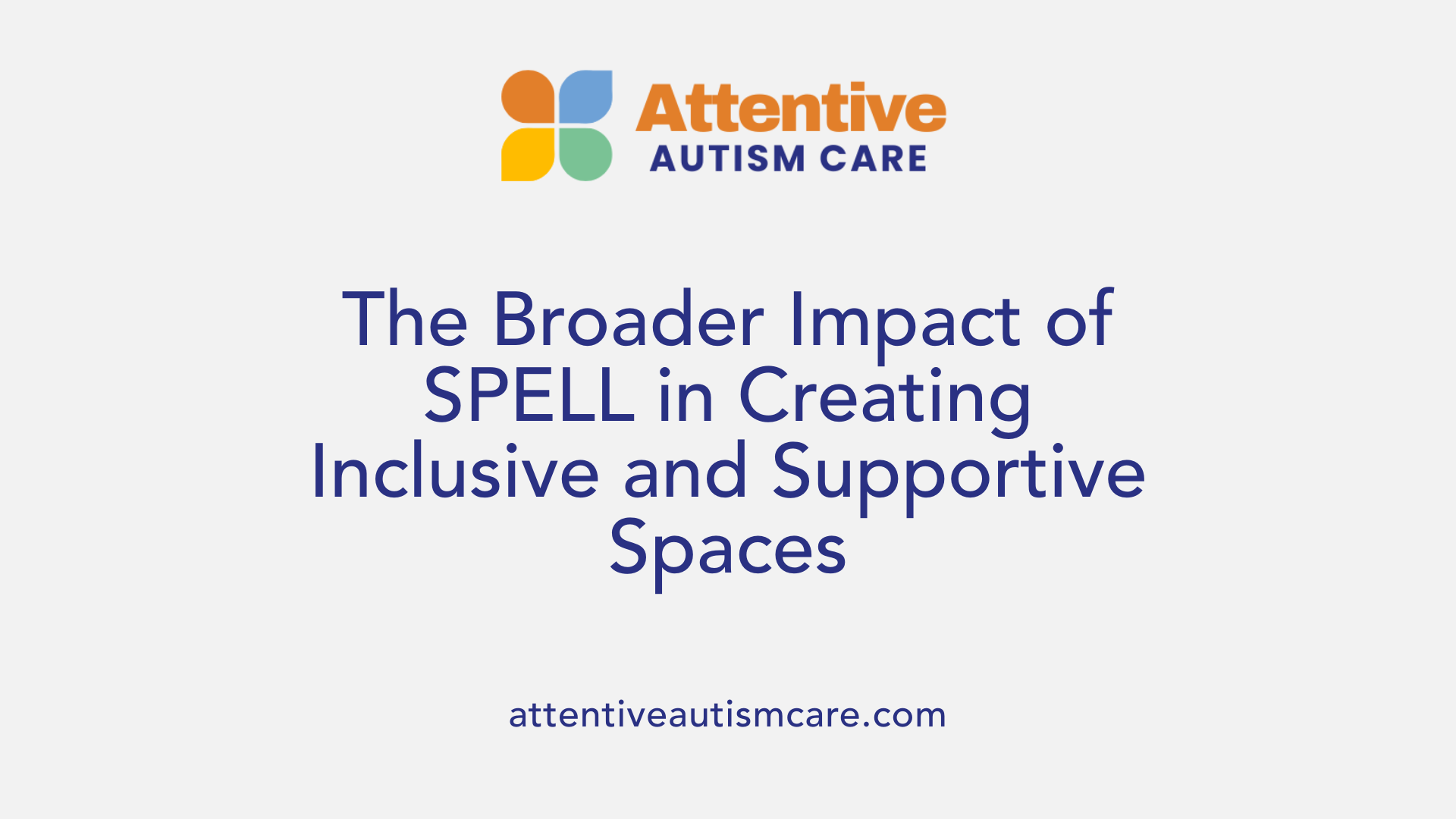 Supporting autistic individuals holistically involves understanding their unique needs and creating environments that foster wellbeing and growth. The SPELL Autism Framework plays a crucial role in this process by offering a structured, evidence-based approach for professionals working across various sectors, including education, healthcare, and community services.
Supporting autistic individuals holistically involves understanding their unique needs and creating environments that foster wellbeing and growth. The SPELL Autism Framework plays a crucial role in this process by offering a structured, evidence-based approach for professionals working across various sectors, including education, healthcare, and community services.
The framework emphasizes five core principles: Structure, Positive approaches and expectations, Empathy, Low arousal, and Links. These principles guide the development of predictable environments that reduce stress and anxiety, helping autistic people feel safe and confident. For instance, visual routines and sensory management strategies create accessible spaces aligned with individual sensory preferences.
Building on these principles, the framework also promotes positive support strategies that highlight strengths and interests, boosting self-esteem and independence. Understanding the perspective of autistic individuals—empathy—is central to tailoring support, ensuring their experiences and feelings are acknowledged.
Addressing common issues such as sensory sensitivities and anxiety, the framework advocates for environments that maintain calmness and minimize distractions. By doing so, it reduces triggers that can cause distress, enabling better engagement and communication.
The broad impact of the SPELL framework extends beyond individual settings. It encourages the development of inclusive environments, where everyone benefits from practices like universal design, sensory-friendly spaces, and consistent communication channels. The framework’s comprehensive training courses ensure that professionals are well-equipped to implement these principles effectively, leading to more consistent, respectful, and effective support.
In summary, the SPELL Autism Framework supports autistic people by fostering understanding, reducing sensory and environmental barriers, and promoting positive relationships. Its holistic approach not only addresses immediate needs but also enhances long-term wellbeing and inclusion across all parts of society.
Development, Purpose, and Relevance of the Framework
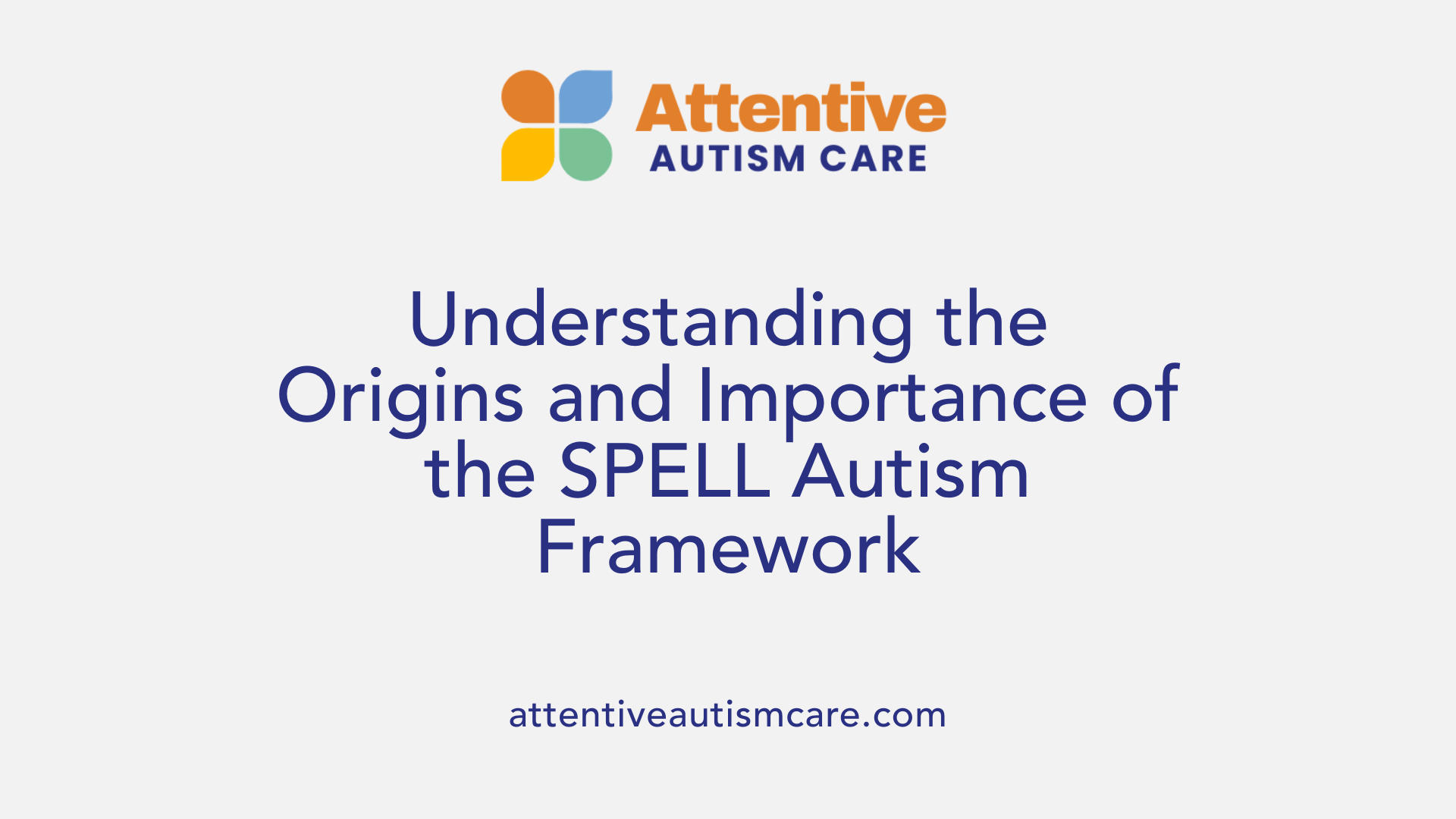
What is the development, purpose, and relevance of the SPELL Autism Framework?
The SPELL Framework was developed by the National Autistic Society to improve how society supports autistic individuals. Its creation was grounded in evidence-based practices, aiming to foster more inclusive environments that respect and meet the unique needs of autistic people.
The framework’s primary goal is to guide professionals, caregivers, and support staff in creating environments and approaches that significantly reduce stress and anxiety for autistic individuals. It emphasizes understanding each person’s perspective, building confidence, and enabling independence through tailored support strategies.
Environmental adjustment is a core element of SPELL, involving modifications such as visual schedules, sensory management, and calm, predictable routines. These help minimize sensory overload and create a sense of safety.
The relevance of the SPELL Framework in today’s support practices is substantial. It is widely adopted in educational, healthcare, and community settings, becoming a foundational tool for autism care. Its principles facilitate better communication, stronger support networks, and personalized intervention plans.
This holistic approach promotes the wellbeing of autistic children and adults, encouraging environments that help them thrive. It also aligns with contemporary understandings of autism, promoting empathy, respect, and empowerment rather than mere management.
In summary, the SPELL Framework’s development was driven by a commitment to understanding autism deeply and applying practical strategies that foster inclusion, understanding, and support. Its ongoing relevance highlights its vital role in advancing respectful and effective autism support practices across various sectors.
Embracing the SPELL Method for Inclusive Support
The SPELL Autism Framework offers an essential, evidence-based guide for creating supportive environments that respect and meet the unique needs of autistic individuals. Through its core principles—Structure, Positive, Empathy, Low arousal, Links—it enables professionals and families to foster trust, independence, and well-being. As awareness of autism grows, the SPELL Framework’s holistic approach continues to underpin best practices and inspire more inclusive, understanding communities. Investing in training and applying these principles widely can significantly improve the support given to autistic individuals, helping them thrive.
References
- The SPELL framework - National Autistic Society
- The Five Aspects of the SPELL Autism Approach
- Supporting autistic people using the SPELL framework
- Implementing the SPELL Framework: A Holistic Approach to ...
- Spell Framework - AT-Autism
- SPELL Framework - Integrated Treatment Services
- SPELL Framework - Marlborough School
- What is the SPELL Autism Framework? | SEND | Twinkl Inclusion




































































































